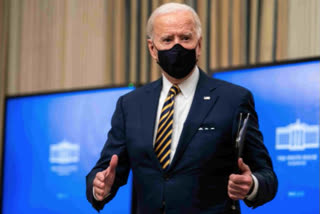New York: Joe Biden wagered his campaign and now his presidency on the premise that government itself could still work, even at a time of fractious political division. When the Senate voted this week, with bipartisan support, to begin work on an infrastructure bill that Biden supported, he seemed to have proof of the concept. But the triumph was overshadowed by the surging delta variant of the coronavirus that has forced the restoration of mask guidelines, imperilled the nation's economic recovery and threatened Biden's central promise that he would lead the United States out of the pandemic.
Democrats have to put wins on the board going into 2022, and COVID clouds on the horizon make getting infrastructure and reconciliation done all that much more important, said Robert Gibbs, former press secretary to President Barack Obama. He added that it's imperative for the Biden administration to communicate on this regularly and prepare us for the ups and downs of this pandemic.
The president's first six months in office, for which he has received strong marks in most public polls, featured the full vaccination of more than 60% of Americans, the creation of more than 3 million new jobs and the passage of a sweeping $1.9 trillion COVID relief bill. And in recent days, he has made progress along the massive, two-pronged infrastructure track that could pour $4.5 trillion into the United States' economy while he also eyed future moves on voting rights and immigration.
Read: COVID-19 crisis: US sending 'whole series' of help to India, says Biden
But the virulence of the delta strain coupled with stubborn vaccine hesitancy among a significant portion of the American population has raised alarms about another punishing wave of the pandemic, a prospect that has rattled financial markets already nervously eyeing the possibility of long-term inflation. And now Biden has entered a more challenging phase of his presidency as the virus has once more proven to be an intractable foe that now endangers the nation's fragile return to normalcy.
I know this is hard to hear. I know it's frustrating. I know it's exhausting to think we're still in this fight, Biden said to reporters at the White House on Thursday. And I know we hoped this would be a simple, straight line, without problems or new challenges. But that isn't real life. At the same time, the administration response has hardly been seamless. The administration has been criticized about its messaging on the virus, including confusing guidance this week as to when and why even vaccinated people would need to resume wearing masks indoors.
Biden himself had decreed July 4th be the day that American declared its independence from the virus in front of 1,000 mask-free people at the White House. But just weeks later, staffers and journalists working at the White House were required to don face coverings again, regardless of their vaccination status. And across the country, Americans who revelled in a return to normalcy are now being asked to wear masks again, stirring resentment in some of those who have followed health guidelines throughout the pandemic, including getting the shot. And the rollback calls into question whether the Biden administration had been too quick to relax guidelines and now risked losing some of the public's confidence.
